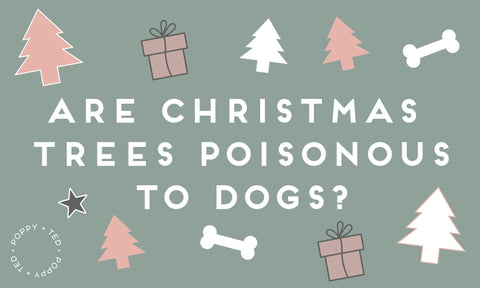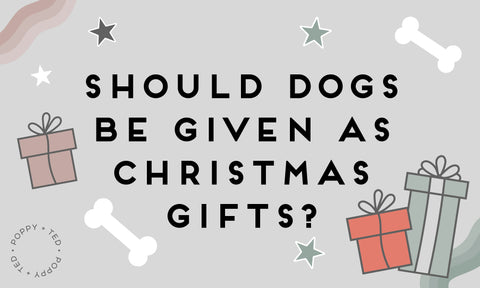
As the days turn colder and the nights get darker, many of us welcome the Christmas season with open arms. We look forward to glittering lights lining the streets, wrapping presents for every member of the family, and of course, dressing the tree with beloved baubles collected throughout a lifetime of memories.
So, naturally, our four-legged friends are also curious about the excitement in the air. Especially when the huge, green tree takes up residence in what might even be one of their favourite spots to lounge in the home.
If you’re concerned about your dog’s reaction or behaviour towards your Christmas tree this year, we have put together a guide filled with all the information you need to know. From the risks that Christmas trees pose to your dog’s health to other festive plants you may want to watch out for, we have all the tips and advice you didn’t even know you needed!
Can You Have a Real Christmas Tree with a Dog?
Let’s begin by answering the question that brought you here first: Are Christmas trees poisonous to dogs?
You will be pleased to know that the answer is no! Christmas trees are not poisonous to dogs.
Typically, real Christmas trees are either fir, spruce or pine trees, which are all non-toxic to dogs and cats. However, that doesn’t mean your pets are totally safe around Christmas trees; they pose other potential risks you might need to keep an eye on.
Christmas Tree Needles
For dogs, Christmas trees bring with them interesting scents they won’t be able to keep their noses away from. Investigating these smells further may tempt them to lick, bite and chew the branches of your tree, which is where the problems arise.
Tree needles can irritate your pet’s mouth and lead to an upset tummy if eaten. You might also notice scratched, irritated and sore paws caused by walking on needles that have dropped from the tree.
Tree Ornaments
Decorations on the Christmas tree also pose a potential hazard for your dogs. They are naturally curious about the bright-coloured baubles and dangling ornaments. In particular, you should be cautious of salt-dough ornaments, chocolate decorations, glass baubles and fairy lights.
We recommend leaving any edible decorations off of your Christmas tree this year and keeping any fragile ornaments towards the top of the tree and away from curious paws and jaws.
4 Christmas Plants that are Unsafe for Dogs
A real Christmas tree is, of course, the largest festive plant you will bring into your home this festive season, but it is not the only one. There are a variety of festive plants we love to decorate our homes with over Christmas, but some you need to be cautious of around your dog.
1.Holly
Holly is a Christmas staple used in a wreath, garland, or hung over your fireplace. But if you have a dog, you should avoid using fresh holly in your home this festive season.
Both holly leaves and berries are toxic to dogs; if eaten, they can cause diarrhoea and vomiting. Their spikey leaves can also irritate a dog’s mouth and paws.
2. Ivy
Traditionally, ivy is used to create wreaths and garlands, but this beautiful, sprawling plant can harm your dogs. Every part of the plant contains harmful toxins; however, the leaves are especially dangerous to your furry friends. Ingesting ivy can induce vomiting and diarrhoea in dogs. The sap from ivy leaves has also been found to cause allergic reactions when in contact with your dog's skin.
3. Mistletoe
Another popular festive decoration, mistletoe, is traditionally hung over doors in the home. However, now it is used in many Christmas decorating, so you must keep real mistletoe away from your dogs. The plant causes diarrhoea, and vomiting like holly plants do. However, it can cause breathing problems and even symptoms of confusion.
4. Poinsettia
Finally, you should also be wary of poinsettia plants around all animals in your home. However, it is considered to be only mildly toxic and not as dangerous as the other festive plants we have listed. Poinsettia will only cause major issues to your animals if ingested in large quantities. Luckily, pets will usually quickly grow tired of eating the plants as they can irritate their mouths. Still, you should keep it out of reach of curious noses, just in case.
What To Do If Your Dog Eats a Dangerous Plant
If you’re concerned that your dog may have eaten a dangerous or toxic plant this season, here are a few tips to help you with what to do next.
- Remove the plant from your pet’s reach immediately in case they decide to return for more.
- Take a picture of the plant to show your vet and get an idea of how much of the plant has been chewed/eaten.
- Check that your dog is behaving normally and not showing any signs of breathing difficulties. If they appear fine, keep an eye out for any deterioration.
- If your dog does not appear to be behaving normally, call your usual vet or a local emergency vet immediately to seek further advice.
Remember, the sooner you get your dog seen by a vet will ensure the better likelihood that it can recover from the poisoning.
We hope our guide has given you all the information and advice you need for Christmas so you can ensure a safe and happy celebration for the entire family. Fur babies included!
Look for other ways to get your dogs involved in the festive fun with our Christmas dog accessory collection, where you can find a wide range of cosy and jolly designs on leads, collars and accessories.
Alternatively, look for more advice on festive foods to avoid giving to your dogs and other Christmas tips on our blog!



